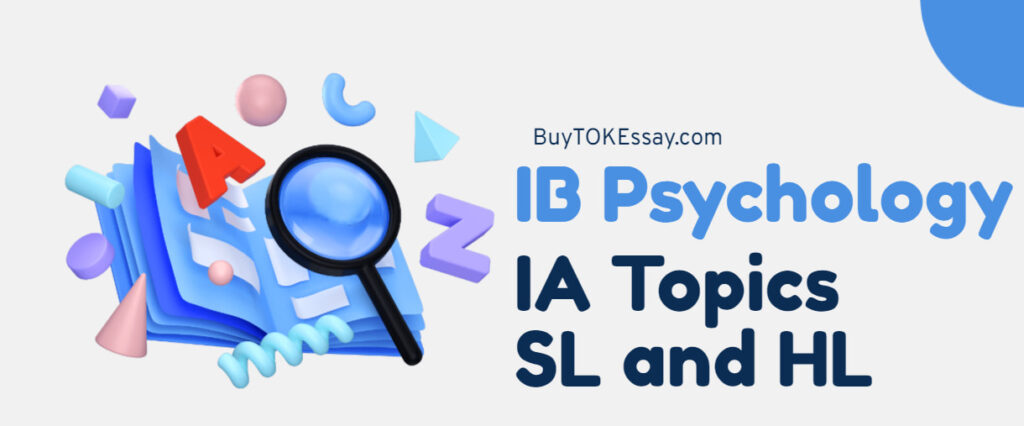You must pick the right topic to do well on the Sports, Exercise, and Health Science Internal Assessment. From what I’ve seen, this is one of the most critical parts of the writing process. Also, it makes the IA more exciting and accessible to handle and sets the tone for your research. So, in this article, I will provide Sports, Exercise and Health Science IA topics for your inspiration.
What Is the Sports, Exercise and Health Science IA?
The Internal Assessment is a critical IB Sports, Exercise, and Health Science course component. Through actual research, students may demonstrate how well they comprehend theoretical information. In my opinion, this is one of the most exciting aspects of the IB SEHS curriculum, as it lets students apply scientific approaches to real-world scenarios while researching subjects they are interested in.
The IA entails planning and carrying out an exercise, sports, or health-related experiment or study. You will need to formulate a research question, collect information, and evaluate your results while connecting your study and the fundamental ideas of SEHS. Treating the IA carefully is critical since it significantly impacts your final grade.
I like helping students with the IA process because it gives them the chance to investigate a variety of topics, such as:
- Exercise physiology and its effects on the body.
- The biomechanics of movement in various sports.
- Psychological factors that influence athletic performance.
- Nutritional impacts on health and fitness.
Each area offers a wealth of potential for investigation, and choosing the right topic is the first step to success. The IA tests your academic skills and helps you develop critical thinking and research abilities essential for future studies or careers in sports science, health, or fitness. So, choose a topic that excites you and ties back to the SEHS curriculum — you’ll find the process far more rewarding.
Looking for engaging Dance IA topics? This article provides a range of ideas to spark creativity and meet IB’s analytical standards.

Top Sports, Exercise and Health Science IA Topics
Having mentored many IB students, I have direct experience with the most appropriate topics for the SEHS Internal Assessment. Here are some suggestions to get you going, divided into several categories.
Exercise Physiology
Exercise physiology focuses on the body’s reaction to physical exertion. This field could include many studies on human health, performance, and recovery.
- How does hydration affect endurance performance in long-distance running?
- The effects of different recovery techniques on muscle soreness after high-intensity workouts
- How does caffeine consumption impact athletic performance in sprint-based sports?
- Analyzing the impact of altitude on aerobic capacity in athletes
- How does heat exposure affect cardiovascular performance during prolonged exercise?
- The influence of different pre-workout supplements on athletic performance
- Comparing the effects of static vs. dynamic stretching on flexibility and injury prevention
- How does sleep deprivation affect reaction times in high-intensity sports?
- Analyzing the effect of varying carbohydrate intake on endurance in cyclists
- The impact of high-intensity interval training (HIIT) on cardiovascular health
- Comparing the effectiveness of resistance vs. endurance training on muscle hypertrophy
- How does cold-water immersion impact recovery times in athletes after endurance events?
Biomechanics
The science of biomechanics entails examining every aspect of bodily movement, from joint motion to forces applied during exercise. Students interested in mechanics and physics and how they apply to sports will love this subject. In my opinion, this area offers the opportunity to integrate theory with practical experimentation.
- How does footwear type affect the biomechanics of running?
- Comparing the biomechanics of sprinting vs. long-distance running
- How do different swimming techniques affect stroke efficiency in freestyle?
- Analyzing the role of arm position in improving balance during cycling
- The impact of posture on performance in weightlifting
- How do different running surfaces (track, grass, treadmill) affect gait and joint impact?
- Analyzing the biomechanical factors that influence jump height in basketball players
- The role of knee angle in reducing injury risk during squats
- How does core strength impact balance and stability in gymnastics?
- Comparing the effectiveness of different kicking techniques in soccer
- The influence of racket string tension on shot accuracy in tennis
- How does fatigue affect running mechanics during a marathon?
Sports Psychology
The study of how psychological and emotional aspects impact athletic performance is known as sports psychology. This fascinating area allows students to investigate the psychological aspects of fitness and sports, which may be just as significant as the actual training. Motivation, worry, mental exhaustion, and many other topics might be the subject of this kind of research.
- How does pre-game anxiety affect performance in high-stakes competitions?
- The effects of mindfulness training on stress management in athletes
- How does mental imagery impact performance in precision sports like archery?
- Analyzing the role of team cohesion on performance in team sports
- The impact of self-talk on motivation and performance in endurance athletes
- How does crowd support influence performance in home vs. away games?
- Effect of sleep quality on mental focus and decision-making in athletes
- How does goal-setting influence performance in weightlifting?
- Comparing the effectiveness of cognitive-behavioral therapy vs. relaxation techniques in managing sports-related stress
- The impact of mental fatigue on reaction times in fast-paced sports
- How does performance pressure affect decision-making in soccer players?
- The influence of motivation type (intrinsic vs. extrinsic) on long-term athletic success
Nutrition and Performance
Proper nutrition is essential for optimal sports performance, recovery, and general health. In my opinion, this category allows students to investigate how various dietary approaches might impact physical results.
- The effects of carbohydrate loading on endurance performance in marathon runners
- How does protein intake post-exercise impact muscle recovery in strength athletes?
- Comparing the impact of a ketogenic diet vs. a high-carbohydrate diet on endurance athletes
- The role of hydration on cognitive performance during high-intensity workouts
- Analyzing the effects of intermittent fasting on body composition and performance
- The influence of omega-3 fatty acids on inflammation and recovery in athletes
- How does caffeine affect endurance performance in cyclists?
- The role of pre-workout nutrition in enhancing performance in sprinters
- The impact of plant-based diets on athletic performance in competitive athletes
- How does sugar consumption pre-game affect short-term athletic performance?
- The effectiveness of different electrolyte drinks in maintaining hydration during prolonged exercise
- How does vitamin D supplementation influence athletic performance and recovery?
Injury Prevention and Rehabilitation
Sports science strongly emphasizes injury prevention and rehabilitation, which address how athletes may stay injury-free and recuperate from injuries. This area allows students to learn about actual sports and health-related topics. Athletes of all skill levels may immediately use the highly applicable issues in this field.
- How do different warm-up techniques influence injury prevention in soccer players?
- Comparing the effectiveness of balance training vs. strength training in reducing ankle sprains
- The role of proprioception exercises in preventing knee injuries in basketball players
- How does flexibility training affect injury rates in competitive gymnasts?
- Analyzing the effectiveness of eccentric training in preventing hamstring injuries
- How does core stability training impact lower back pain in athletes?
- The role of neuromuscular training in reducing ACL injury risk in female athletes
- Comparing the recovery times of athletes using cryotherapy vs. ice baths post-injury
- How does sleep quality affect injury recovery in professional athletes?
- The influence of sports massage on recovery from soft tissue injuries
- Analyzing the effectiveness of different rehabilitation programs for shoulder injuries in swimmers
- The role of strength training in preventing overuse injuries in long-distance runners
You can concentrate on your studies while still having a lot of creative freedom when using these categories and subjects for your IB SEHS Internal Assessment. Select one that interests you, and you’ll have fun researching and coming up with something insightful!

Need Help with Your IB Internal Assessment?
Reach your full ability and improve your IB IA scores with our help. The BuyTOKEssay.com team can help you write an excellent paper from scratch or tweak your current project to match your supervisor’s requirements.
You can buy an Internal Assessment that fits your needs with just one click.
How to Choose Your Sports, Exercise and Health Science IA Topic?
Selecting the appropriate topic for the Sports, Exercise and Health Science IA is one of the trickiest parts of the process. My experience tells me that you should begin by determining what topics interest you. Consider the themes related to Sports, Exercise, and Health Science IA that most excite you. Choose a topic you are interested in, whether the psychology of exercise or the mechanics behind sports performance; this will make your study more fulfilling.
Aligning your topic with the SEHS curriculum is also crucial. Find a topic that will enable you to show how your actual experiment relates to the theoretical framework you have learned. For example, choosing a subject in biomechanics or exercise physiology might provide many options to carry out significant research.
Don’t overcomplicate your subject, either. Balance ease of use and intricacy. A simpler one with unambiguous findings often outperforms an excessively ambitious experiment without reliable data.
The next important step after choosing a subject is to create your IA. You must first formulate a precise, well-chosen research question. My experience has shown that your inquiry will be more concentrated if the question is more straightforward. For instance, you may focus your inquiry on “How does hydration affect the performance of long-distance runners?” rather than “What are all the factors that affect hydration in sports?”
Conclusion
In summary, selecting an appropriate subject, staying organized, and connecting theoretical knowledge with practical work are the keys to a successful IB SEHS Internal Assessment.
In my view, the best students are enthusiastic about their studies and love the process. Choose a subject that interests you, then go to work writing an IA that captures your enthusiasm for Sports, Exercise and Health Science.
If you need assistance with your Theory of Knowledge course or Internal Assessments, contact our professionals at BuyTOKEssay.com.





